
|
|
| 1950th | 1960th | 1970th | 1980th | 1990th | Links |
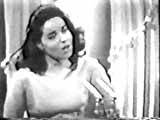 Having won the 1957 and 1959 contests the Netherlands
refused to organize the 1960 “Eurovision Grand Prix” and this allowed the
United Kingdom to take over. The number of participating countries rose to thirteen,
Luxembourg returned and Norway joined the contest. In addition, Finland decided to
broadcast the final live. A new rule was introduced in the voting system, whereby the
juries were assembled only to hear and not see the dress rehearsal of each competing song
just before the actual contest. France was awarded the Grand Prix, and for the first time
the winning song, “Tom Pillibi” performed by Jacqueline Boyer, became a real
international hit. Having won the 1957 and 1959 contests the Netherlands
refused to organize the 1960 “Eurovision Grand Prix” and this allowed the
United Kingdom to take over. The number of participating countries rose to thirteen,
Luxembourg returned and Norway joined the contest. In addition, Finland decided to
broadcast the final live. A new rule was introduced in the voting system, whereby the
juries were assembled only to hear and not see the dress rehearsal of each competing song
just before the actual contest. France was awarded the Grand Prix, and for the first time
the winning song, “Tom Pillibi” performed by Jacqueline Boyer, became a real
international hit. |
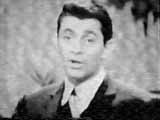 in 1961 three more countries joined the
“Eurovision Grand Prix”, increasing the number of participants to sixteen. The Grand
Prix was awarded to Luxembourg with the song “Nous les amoureux” performed by
Jean-Claude Pascal, and the German artist surprised everyone by singing partly in German
and partly in French. in 1961 three more countries joined the
“Eurovision Grand Prix”, increasing the number of participants to sixteen. The Grand
Prix was awarded to Luxembourg with the song “Nous les amoureux” performed by
Jean-Claude Pascal, and the German artist surprised everyone by singing partly in German
and partly in French. |
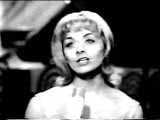 In 1962 the time allocation per song was
reduced to three minutes and a brand new voting system was introduced which allowed the
national jury to select the three songs it considered the best. Each member of the
national jury could award 6 voting points; 3 points to the best song, 2 points to the
second best and 1 point to the third best. All ten members of each national jury would
vote anonymously, and thus the number of points would total 60, the three songs with the
largest number of points being considered the best. The song with the highest number of
points would receive 3 points, the second highest 2 points and the third highest 1 point:
this would become their final vote and be announced as part of the “European jury’s
vote”. Although Belgium, Spain, Austria and the Netherlands scored zero points as a
result of the new system, it clearly showed that France had won with the song “Un
premier amour”, performed by Isabelle Aubret, scoring 26 points. In 1962 the time allocation per song was
reduced to three minutes and a brand new voting system was introduced which allowed the
national jury to select the three songs it considered the best. Each member of the
national jury could award 6 voting points; 3 points to the best song, 2 points to the
second best and 1 point to the third best. All ten members of each national jury would
vote anonymously, and thus the number of points would total 60, the three songs with the
largest number of points being considered the best. The song with the highest number of
points would receive 3 points, the second highest 2 points and the third highest 1 point:
this would become their final vote and be announced as part of the “European jury’s
vote”. Although Belgium, Spain, Austria and the Netherlands scored zero points as a
result of the new system, it clearly showed that France had won with the song “Un
premier amour”, performed by Isabelle Aubret, scoring 26 points. |
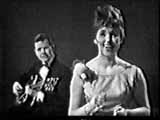 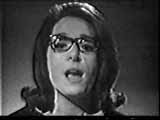 Like the Netherlands in 1960, France
declined to stage the 1963 contest. The United Kingdom took over the “Eurovision
Grand Prix” and for the first time the programme was produced by a woman. Following on
from those of the previous year, further changes were made to the voting system, in
particular by expanding the number of jury members for each participating country to 20.
The number of points allocated to each member was increased from 3 to 5; this gave juries
the opportunity to vote for their five favourite songs. The system was exactly the same as
in 1962, the only change being that jury members could now vote for five songs instead of
three. Two of today’s most celebrated singers participated in the contest, Nana
Mouskouri, who performed for Luxembourg and finished in 7th place, and Françoise Hardy
who represented Monaco and finished 5th. The winner was Denmark with the song
“Dansevise”, performed by Grethe and Jorgen Ingmann. Like the Netherlands in 1960, France
declined to stage the 1963 contest. The United Kingdom took over the “Eurovision
Grand Prix” and for the first time the programme was produced by a woman. Following on
from those of the previous year, further changes were made to the voting system, in
particular by expanding the number of jury members for each participating country to 20.
The number of points allocated to each member was increased from 3 to 5; this gave juries
the opportunity to vote for their five favourite songs. The system was exactly the same as
in 1962, the only change being that jury members could now vote for five songs instead of
three. Two of today’s most celebrated singers participated in the contest, Nana
Mouskouri, who performed for Luxembourg and finished in 7th place, and Françoise Hardy
who represented Monaco and finished 5th. The winner was Denmark with the song
“Dansevise”, performed by Grethe and Jorgen Ingmann. |
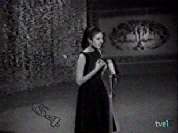  In 1964, Sweden had to withdraw from the
contest due to an artists’ strike, but there were still sixteen participating countries
since Portugal joined in. The voting system was changed once more: the membership of each
jury was reduced from 20 to 10 and members had 9 points to award. The song that was
awarded the most votes within the jury would be allotted 5 points, the second obtaining
the second largest number of votes would be allotted 3 points, and that with the third
largest number of votes would be allotted one point. In the event of one song gaining all
the votes, this song would be allotted all 9 points, and if only two songs received all
the votes the first one would be allotted 6 points and the second 3 points. If three songs
or more received votes, the first would be allotted 5 points, the second 3 points and the
third 1 point. Portugal, Switzerland, West Germa ny and Yugoslavia scored zero points,
while Italy far outstripped its closest runner-up with 16-year-old Gigliola Cinquetti, who
also went on to achieve wider fame, singing “Non ho l’étà”. Other well-known
artists were Hugues Aufray, representing Luxembourg and placed 4th with the song “Dès
que le printemps revient”, and Udo Jürgens, representing Austria placed 5th with
“Warum nur warum?”. In 1964, Sweden had to withdraw from the
contest due to an artists’ strike, but there were still sixteen participating countries
since Portugal joined in. The voting system was changed once more: the membership of each
jury was reduced from 20 to 10 and members had 9 points to award. The song that was
awarded the most votes within the jury would be allotted 5 points, the second obtaining
the second largest number of votes would be allotted 3 points, and that with the third
largest number of votes would be allotted one point. In the event of one song gaining all
the votes, this song would be allotted all 9 points, and if only two songs received all
the votes the first one would be allotted 6 points and the second 3 points. If three songs
or more received votes, the first would be allotted 5 points, the second 3 points and the
third 1 point. Portugal, Switzerland, West Germa ny and Yugoslavia scored zero points,
while Italy far outstripped its closest runner-up with 16-year-old Gigliola Cinquetti, who
also went on to achieve wider fame, singing “Non ho l’étà”. Other well-known
artists were Hugues Aufray, representing Luxembourg and placed 4th with the song “Dès
que le printemps revient”, and Udo Jürgens, representing Austria placed 5th with
“Warum nur warum?”. |
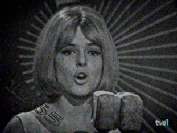 In 1965, Sweden returned and Ireland entered the
contest, which increased the number of participating countries to eighteen. The Soviet
Union and other Eastern European countries broadcast the contest, and this opened new
horizons for the show. That year a French star was born called France Gall, who won the
contest representing Luxembourg and singing “Poupée de cire, Poupée de son” written
by Serge Gainsbourg. Star vocalist Udo Jürgens returned for a second time and was placed
4th with the song “Sag ihr, ich lass sie grüssen”, representing Austria. Belgium,
Finland, Spain and West Germany scored zero points. In 1965, Sweden returned and Ireland entered the
contest, which increased the number of participating countries to eighteen. The Soviet
Union and other Eastern European countries broadcast the contest, and this opened new
horizons for the show. That year a French star was born called France Gall, who won the
contest representing Luxembourg and singing “Poupée de cire, Poupée de son” written
by Serge Gainsbourg. Star vocalist Udo Jürgens returned for a second time and was placed
4th with the song “Sag ihr, ich lass sie grüssen”, representing Austria. Belgium,
Finland, Spain and West Germany scored zero points. |
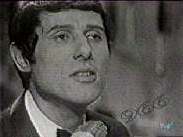 In 1966, the only major change was the new rule on
language. The rule stated that the song selected by each participant must be sung in the
language (or one of the languages) of its country. This rule may have been
introduced because the year before a country had sung in a language other than its own -
Sweden performed in English. As regards the juries, the only change was that each national
jury would consist of representative members of its country’s public, who could include
light and pop music experts but not professional composers, publishers or record
manufacturers. That year Monaco and Italy scored zero points. The Grand Prix winner was
Austria with the song “Merci chérie” performed by Udo Jürgens, who was participating
in the contest for the third time, and well-known French artist Michèle Torr came 8th
with the song “Ce soir je t’attendais”, representing Luxembourg. In 1966, the only major change was the new rule on
language. The rule stated that the song selected by each participant must be sung in the
language (or one of the languages) of its country. This rule may have been
introduced because the year before a country had sung in a language other than its own -
Sweden performed in English. As regards the juries, the only change was that each national
jury would consist of representative members of its country’s public, who could include
light and pop music experts but not professional composers, publishers or record
manufacturers. That year Monaco and Italy scored zero points. The Grand Prix winner was
Austria with the song “Merci chérie” performed by Udo Jürgens, who was participating
in the contest for the third time, and well-known French artist Michèle Torr came 8th
with the song “Ce soir je t’attendais”, representing Luxembourg. |
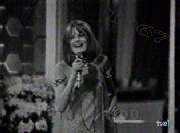 In 1967, Denmark decided not to take part in the
contest, thus reducing the number of participating countries to seventeen. The voting
system reverted to that used in 1957, involving ten jury members representing each county
and allowed to award one vote each to their preferred song. For the first time, the winner
of the Grand Prix was the United Kingdom with the song “Puppet on a string” performed
by Sandie Shaw; Switzerland scored zero points. In 1967, Denmark decided not to take part in the
contest, thus reducing the number of participating countries to seventeen. The voting
system reverted to that used in 1957, involving ten jury members representing each county
and allowed to award one vote each to their preferred song. For the first time, the winner
of the Grand Prix was the United Kingdom with the song “Puppet on a string” performed
by Sandie Shaw; Switzerland scored zero points. |
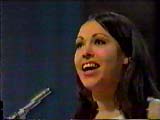 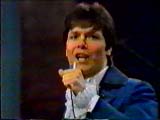 In 1968, United Kingdom
hosted the contest for the first time after being awarded the Grand Prix the previous
year. Spain won by one point with the song “La, la, la …” performed by Massiel, with
top artist Cliff Richard in 2nd place with the song “Congratulations”, representing
the United Kingdom, and Isabelle Aubret in 3rd place with “La Source”, representing
France. In 1968, United Kingdom
hosted the contest for the first time after being awarded the Grand Prix the previous
year. Spain won by one point with the song “La, la, la …” performed by Massiel, with
top artist Cliff Richard in 2nd place with the song “Congratulations”, representing
the United Kingdom, and Isabelle Aubret in 3rd place with “La Source”, representing
France. |
| 1969 turned out to be
one of the most exciting years, with four countries out of the sixteen being awarded the
Grand Prix: France with the song “Un Jour, Un Enfant” performed by Frida Boccara, the
Netherlands with “De troubadour” performed by Lenny Kuhr, Spain with “Vivo
cantando” performed by Salomé (Maria Rosa Marco) and the United Kingdom with “Boom
bang a bang” performed by Lulu. That year’s contest was also marked by other important
events: Salvador Dali created the Eurovision Grand Prix publicity and a 12-year-old boy
sang for Monaco, which finished 3rd.
|
| 1950th | 1960th | 1970th | 1980th | 1990th | Links |